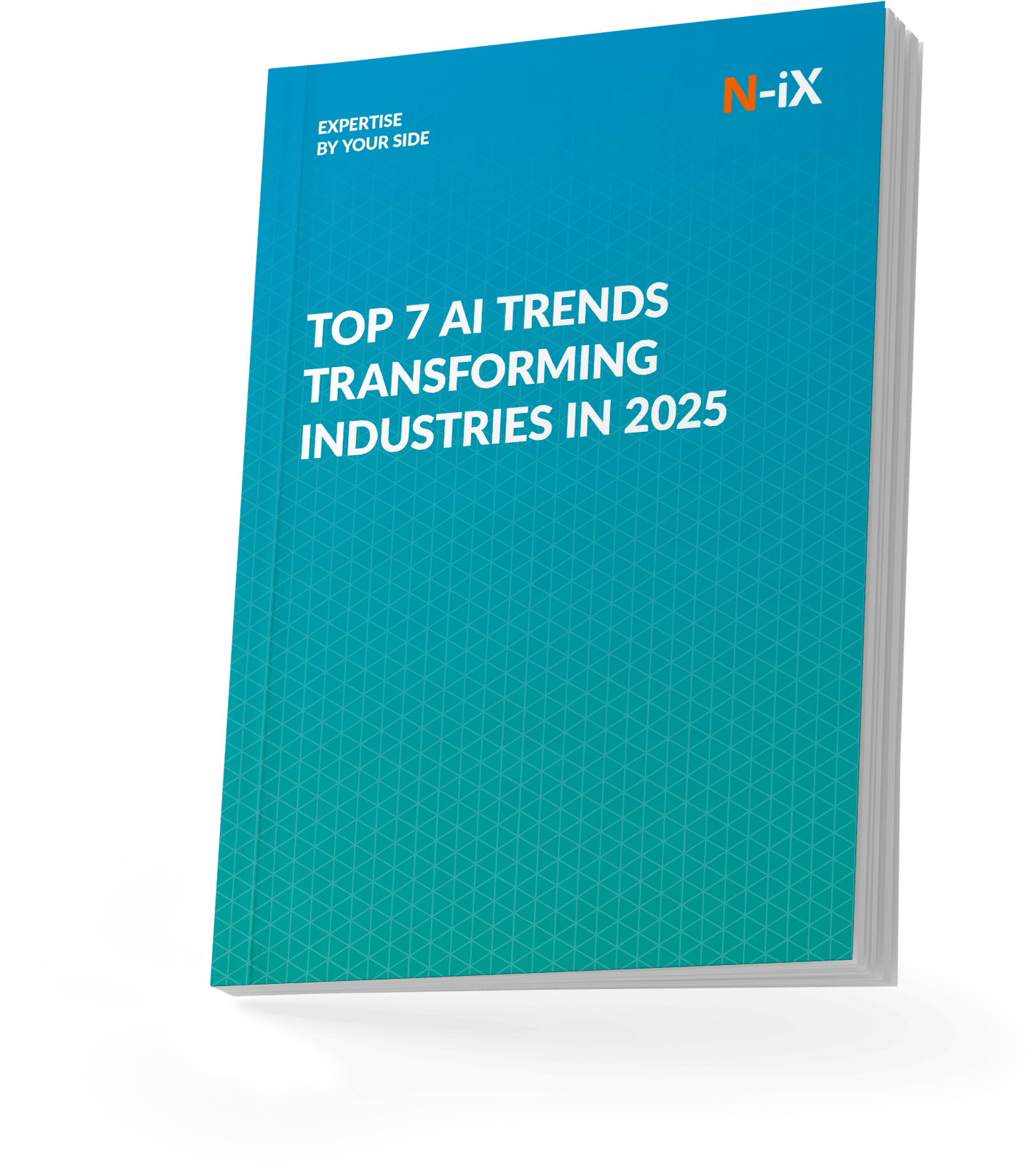According to Statista, Machine Learning will remain a dominant segment of the technology market in the coming years, with market size expected to grow from $113.10B this year to $503.40B by 2030. This growth reflects the increasing demand for actionable data insights and innovative applications that address complex business challenges. From identifying trends in vast datasets to automating routine processes, Machine Learning enables organizations to deliver smarter, faster, and more personalized solutions.
Leveraging tailored AI and ML development services helps businesses transform their operations, refine customer engagement strategies, and explore innovative opportunities for growth in competitive markets. Companies that use these technologies are better positioned to adapt to changing dynamics, mitigate risks, and achieve sustainable success.
What are the benefits of Machine Learning? How is ML applied in real-world scenarios? What does the process of ML implementation look like? Let’s find out.
3 types of benefits of Machine Learning in business
Machine Learning helps businesses uncover meaningful patterns in their data, leading to better strategies and operational improvements. Adaptive algorithms enable organizations to adjust quickly to new challenges and opportunities. Unlike traditional rule-based systems, ML algorithms learn and adapt over time, enabling continuous improvement and scalability. These qualities position ML as a powerful tool for addressing complex challenges in dynamic and data-rich environments. Here are the 3 key universal types of benefits of Machine Learning.
Business optimization
Machine Learning allows businesses to identify patterns, optimize processes, and make data-driven decisions aligned with their strategic goals. An organization can focus its ML efforts on refining decision-making, minimizing risks, and uncovering opportunities to drive measurable outcomes and operational improvements. Key applications of ML for business optimization include:

- Accurate forecasting: ML algorithms identify patterns in historical data to predict future trends accurately. Businesses use these insights to anticipate demand, allocate resources effectively, and minimize waste, enabling informed decision-making and proactive planning.
- Cost reduction: Automating repetitive tasks and optimizing workflows with ML saves time and reduces operational expenses. For instance, by implementing predictive maintenance, businesses can minimize downtime in manufacturing by identifying equipment issues before they escalate, lowering repair costs, and extending asset life. Additionally, ML models can optimize energy consumption by analyzing usage patterns, helping organizations cut utility expenses in resource-intensive operations.
- Decision-making: Data-driven insights from ML models equip leaders with a clearer understanding of complex situations, speeding up strategic decision-making. Automated data analysis accelerates scenario modeling and enables rapid adaptation to changing conditions. Real-time forecasting lets executives evaluate multiple strategies simultaneously, increasing agility and confidence.
- Risk management: Advanced analytics from ML models uncover potential risks by identifying anomalies and patterns in large datasets. For example, anomaly detection algorithms in cybersecurity monitor network traffic for unusual patterns, helping organizations address threats before they escalate. Similarly, in financial services, ML models flag suspicious transactions to prevent fraud, ensuring compliance and reducing financial losses.
- Fraud detection: Real-time transaction analysis using ML models enables the detection of fraudulent activities before significant damage occurs. As a result, businesses can enhance security and compliance by responding swiftly to potential threats.
- Efficient data management: Automating data processing ensures that information is accurate, accessible, and ready for analysis. Businesses benefit from improved data categorization and retrieval, leading to more effective decision-making.
Learn more about the benefits of Machine Learning in cybersecurity
Enhanced customer interaction
Machine Learning empowers businesses to engage customers more by uncovering unique insights from their behavior and preferences. Tailoring services to individual needs enhances trust and fosters loyalty, creating long-term value for customers and businesses. Notable use cases include:
- Personalization: Tailored recommendations and services based on individual preferences foster stronger customer relationships. Personalization improves satisfaction and builds long-term loyalty.
- Improving customer experiences: Continuous analysis of feedback and behavior helps businesses refine their offerings. Companies can identify and address customer needs quickly, enhancing overall satisfaction.
- Target marketing: ML-driven audience segmentation and targeting optimize marketing campaigns. Businesses achieve higher ROI, improve customer acquisition, and increase retention by delivering relevant messages to the right audiences.
- Natural language processing: Automating the analysis of text and speech enhances customer communication channels, including chatbots and voice assistants. Faster, more accurate responses improve support experiences and overall engagement.
Discover more about churn prediction with Machine Learning
Process efficiency
ML redefines organizational workflows by introducing smarter, automated processes and optimizing resource allocation. Businesses benefit from increased productivity, reduced costs, and more streamlined operations. Applications include:
- Automation of repetitive tasks: Routine tasks are automated, freeing employees to focus on more strategic responsibilities. Businesses improve productivity while reducing manual errors.
- Workflow optimization: Optimizing workflows and resource allocation through ML allows organizations to achieve more with fewer resources. Enhanced operational performance contributes to cost savings and higher output.
- Predictive analytics: Machine Learning in business anticipates future events by analyzing historical data and preparing organizations for potential challenges and opportunities. Forward-looking insights support better decision-making and reduce uncertainty.
- Advanced analytics: Deep learning models analyze complex datasets, revealing insights that were previously inaccessible. These insights fuel innovation, drive better performance, and create a competitive advantage.
Learn how to reshape your price optimization strategy using Machine Learning
Integrating ML-driven solutions into operational processes brings faster, more adaptable workflows. However, certain tasks require expert human oversight to ensure ethical compliance or interpret complex contexts. Human-in-the-loop (HITL) processes involve combining human expertise with machine efficiency, ensuring that critical tasks such as data labeling, model validation, and decision refinement are handled with precision.

The benefits of human-in-the-loop for Machine Learning are most evident in areas like regulated industries, where compliance checks demand a human touch, and customer support scenarios, where nuanced interactions benefit from personal judgment. Pairing machine accuracy with human supervision reinforces accountability, boosts precision, and safeguards against unintended consequences. It is generally a good practice for organizations to maintain this balance for sustainable efficiency and robust decision-making.
Explore the AI landscape of 2025—get the guide with top trends!


Success!

Maximizing benefits of Machine Learning for businesses: N-iX success stories
Machine Learning’s true value lies in its ability to solve complex, real-world business challenges. At N-iX, we don’t just build theoretical models—we craft tailored ML solutions that deliver measurable outcomes. The following case studies illustrate the tangible impact of ML applications across diverse industries.
Predictive maintenance for a top in-flight connectivity provider
Frequent service disruptions and high maintenance costs posed significant challenges for Gogo, a leading in-flight internet provider. The root cause was the inability to predict equipment failures in their satellite antennas, resulting in unexpected downtimes and costly repairs.
To address this, N-iX developed predictive maintenance models that could analyze equipment performance and identify patterns indicating potential failures. The solution involved integrating these models into Gogo’s existing systems, enabling proactive maintenance planning and real-time equipment health monitoring.
As a result, Gogo significantly improved equipment reliability while reducing operational costs. Enhanced system uptime translated into better customer service quality, strengthening the company’s market position.
Learn more about our ML-based solution for Gogo
Inventory management automation for a Fortune 500 industrial supply company
A Fortune 500 industrial supply company struggled with inefficient inventory management, as data was scattered across systems, making it difficult to analyze and act upon. This lack of centralization led to delays, increased costs, and suboptimal decision-making.
To help our client automate inventory management, N-iX designed and implemented a scalable data warehouse solution that consolidated inventory data into a single platform. We also integrated advanced analytics tools to provide stakeholders with actionable insights into inventory-related costs and operational inefficiencies.
The streamlined solution not only improved inventory turnover and reduced overhead costs but also empowered decision-makers with real-time analytics, helping the company optimize its supply chain operations and boost overall efficiency.
Sales forecasting for a leading global fashion retailer
A global fashion retailer faced challenges in predicting product demand across its diverse regions, leading to stockouts in some locations and overstock in others. This imbalance negatively impacted sales and operational efficiency.
N-iX implemented AI-driven demand forecasting models tailored to the retailer’s unique needs. These models leveraged historical sales data, seasonality patterns, and regional trends to provide precise stock allocation recommendations. The solution was seamlessly integrated into the retailer’s inventory management systems, ensuring actionable insights were immediately applicable.
With these advancements, the retailer optimized product availability, reduced instances of stockouts, and maximized sales potential across all key markets. This success underscored the benefits of Machine Learning in solving complex retail challenges.
Read more about improving sales forecasting accuracy in retail
Machine Learning development process with N-iX: 5 key steps
N-iX adopts a client-first approach to ensure the seamless integration of Machine Learning solutions. Our team focuses on delivering measurable results through a structured process tailored to your business needs. Here are the key steps of the implementation journey to ensure your business reaps the benefits of Machine Learning:
1. Product Discovery
N-iX collaborates with stakeholders to identify business challenges and evaluate potential areas where ML can deliver high value. During the discovery phase, success metrics are defined, and a roadmap is created to guide the implementation process.
2. Solution design
Our experts develop tailored ML strategies that incorporate human-in-the-loop elements when beneficial. This phase involves selecting the best algorithms, designing robust data pipelines, and ensuring the solution aligns with the client’s goals while prioritizing scalability and ethical considerations.
3. Implementation and testing
N-iX engineers build and rigorously test ML models, ensuring they perform optimally in real-world scenarios. The process includes seamless integration with existing systems, iterative testing for accuracy, and validation against predefined success metrics.
4. Deployment and support
N-iX ensures the ML solution is smoothly integrated into the client’s business operations. Our team provides ongoing support, monitors performance, and trains internal teams to utilize the solution effectively. Regular maintenance ensures continued reliability and alignment with business needs.
5. Optimization and scaling
After deployment, N-iX refines the ML models to enhance performance and adapt to new data or evolving requirements. Once optimized, the solution is scaled to address broader business challenges, unlocking advanced capabilities like predictive analytics and automation. This iterative process ensures the solution continues to deliver measurable value over time.
Conclusion
ML-driven solutions open new opportunities for organizations to refine decision-making, enhance customer engagement, and optimize processes. Machine Learning creates an environment for continuous improvement and long-term adaptability. Harnessing data-driven intelligence fosters agility, resilience, and sustainable value creation. Recognizing the benefits of Machine Learning ensures businesses can implement strategies that maximize long-term returns and efficiency.
For organizations to achieve these outcomes, partnering with a reliable ML development partner is essential. N-iX supports organizations in their ML journey with tailored solutions that align technology with strategic objectives, driving impactful transformation and a sustained competitive edge.
Have a question?
Speak to an expert




